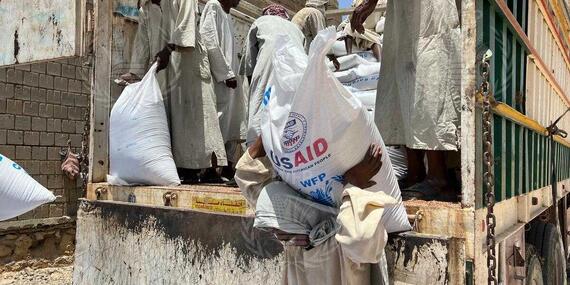Today's top news: Sudan, Myanmar, DRC and Protection of Civilians Week

Sudan
Following the recent ceasefire agreement, humanitarian organizations are ready to move 168 trucks to reach more than 4 million people across the country once conditions allow.
Despite the challenges, the UN and our partners are expanding humanitarian operations to additional locations in Sudan.
The World Food Programme has now reached 500,000 people in several states with food and nutrition assistance since distributions resumed on May 3rd.
The UN Children’s Fund (UNICEF) is supporting Sudan’s Ministry of Health in maintaining immunization services around the country. As of 16 May, vaccine supplies for nearly 244,000 children were dispatched from the capital, Khartoum to seven states.
UNICEF has also delivered nearly 1,500 cartons of ready-to-use therapeutic food to an orphanage center in Khartoum, where more than 300 children are facing severe food shortages.
Myanmar
Today, the humanitarian community launched a flash appeal for US$333 million to help communities devasted by Cyclone Mocha just over a week ago.
The acting Resident and Humanitarian Coordinator for Myanmar, Ramanathan Balakrishnan, said we are in a race against time to provide people with shelter and prevent the spread of water-borne diseases.
Mr. Balakrishnan said donors must dig deep: If we fail to mobilize enough resources, those affected by the storm will face a long and miserable monsoon season.
The flash appeal aims to support some 1.6 million people in the high-impact zone across Rakhine, Chin, Magway, Sagaing and Kachin.
Democratic Republic of the Congo (DRC)
We and our partners continue to help the Government respond to the deadly floods and landslides in the country’s east. Kalehe territory in the eastern province of South Kivu was hit particularly hard.
At least 17,000 people have received assistance including food, health care, shelter and psychosocial support since 10 May. We have provided more than 50,000 liters clean water to affected communities on a daily basis.
The Humanitarian Coordinator, Bruno Lemarquis, allocated $3 million from the DRC Humanitarian Fund to strengthen the continuing operations.
According to latest official figures, at least 443 people have died, hundreds have been injured and many more are still missing. More than 3,000 houses were damaged, including school, keeping more than 9,000 children from attending school.
There is still an urgent need for tools to excavate and bury bodies. Other top priorities are shelter and relocation of survivors, food assistance and fixing roads and bridges so we can reach people affected.
Protection of civilians
A series of informal side events known as “Protection of Civilians Week 2023” are taking place this week in New York, coordinated by OCHA, Belgium, Switzerland, and the NGOs CIVIC and the International Rescue Committee.
It brings together Member States, UN agencies, the Red Cross and Red Crescent movement, and civil society organizations to discuss the issue of protection of civilians, including by amplifying the voices of people affected by armed conflict. More information on the events is available here.
